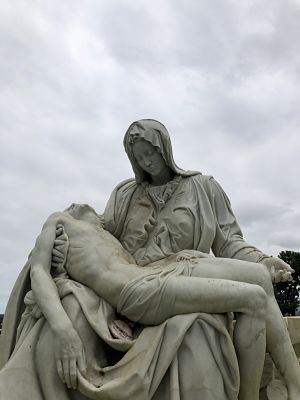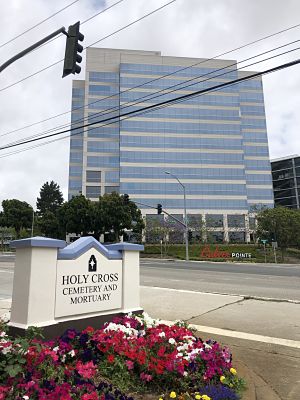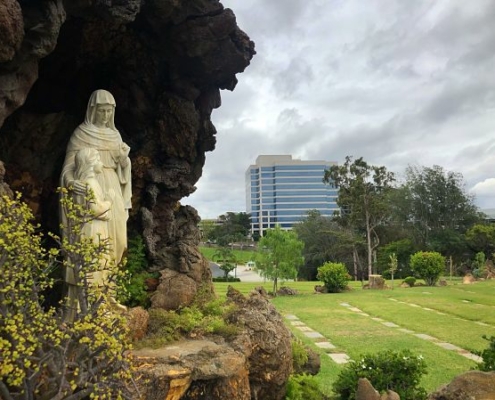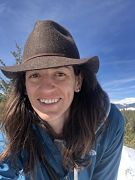What We Think We Know
Just before landing in Los Angeles, when the plane lowered from the sky into the smog, I thought of death. Not of personal death as in his or hers, yours or mine, but of total annihilation. It didn’t seem extraordinary to think that life as I knew it might end during the ten days I would be in L.A., that one of the many apocalypses I’d been promised would actually come, here and now. I felt a perverse sense of satisfaction with the specifics of the smog, like a hungry dog who’d snuck into a bag of Cheetos, gotten his head stuck inside, and died—his last inhale full of his own orange stained emissions.
 I’m not sure exactly when I started thinking about the end of the world so casually, only that, in recent years, cataclysm seemed so much more real than my own mortality. These days it’s pretty normal for casual conversation to feature apocalyptic themes and totally rational to make major life decisions based on the worst-case scenario, which I have. In case the economy collapses, I moved to an Earthship; in case of ecosystem demise, I have reserves of water and food; in case God gets spiteful, I have been baptized, much to the chagrin of my Jewish mother. Less polite is to bring up one’s own death or worse, to entertain what it might be like to actually die. But as the plane’s wheels touched the tarmac, I thought, just for a fleeting second, about how sad it would be to die in a strange land, surrounded by people, but all alone. It was the first time I’d ever thought about how I wanted to die in the arms of someone I loved.
I’m not sure exactly when I started thinking about the end of the world so casually, only that, in recent years, cataclysm seemed so much more real than my own mortality. These days it’s pretty normal for casual conversation to feature apocalyptic themes and totally rational to make major life decisions based on the worst-case scenario, which I have. In case the economy collapses, I moved to an Earthship; in case of ecosystem demise, I have reserves of water and food; in case God gets spiteful, I have been baptized, much to the chagrin of my Jewish mother. Less polite is to bring up one’s own death or worse, to entertain what it might be like to actually die. But as the plane’s wheels touched the tarmac, I thought, just for a fleeting second, about how sad it would be to die in a strange land, surrounded by people, but all alone. It was the first time I’d ever thought about how I wanted to die in the arms of someone I loved.
The next morning, eager to begin our writing residency, my temporary roommate and I woke up early to take our first walk through Culver City. The trek, which should have been straightforward, from our Airbnb on the side of a concrete wrapped river to 400 Corporate Pointe, the eight-story home for our three-story MFA program, was complicated by a city shaped by and for cars. Or, as Google Maps put it: “walking directions may not always reflect real-world conditions.” The most extreme example of the addendum happened sometime between our coming and going when a car careened off the elevated highway and down onto the sidewalk of the suburban subfloor. All future walks were haunted by the possibility of such a random finale. The more colloquial example of Google’s warning came in the everyday of vanishing sidewalks and overgrown shrubs and old cats sunbathing on concrete and unpassable intersections at which three streets had to be crossed instead of just one. To walk in L.A. is to meander.
 The final crossing of our walk was over a busy street halfway up the hill leading to Corporate Pointe. While we waited for the static red hand to disappear, I stared off toward our glass-sided end, visible and shimmering in the dull light of the June fog. I remembered then the first time I saw Antioch’s campus, how shocked I was to see a program promising both art and justice stuffed inside an office park. At the time, the school’s rectangular landscape threatened like a form of death and I couldn’t help but wonder if I’d been duped, like so many students in the United States are duped, into paying for a degree when what I’d wanted was an education. But by the end of my first residency, the program had redeemed itself completely—with an edict only for original thought, professors who encouraged students to disagree, and students who learned the rules so as to break them—I’d become quite proud of my would be alma mater. And, I’d come to see the office park as the best possible place for writers to become artists—why should we deny an education the context of the world? What made less sense was to deny consumerism, as so many universities do, with grassy knolls meant to keep the world at bay.
The final crossing of our walk was over a busy street halfway up the hill leading to Corporate Pointe. While we waited for the static red hand to disappear, I stared off toward our glass-sided end, visible and shimmering in the dull light of the June fog. I remembered then the first time I saw Antioch’s campus, how shocked I was to see a program promising both art and justice stuffed inside an office park. At the time, the school’s rectangular landscape threatened like a form of death and I couldn’t help but wonder if I’d been duped, like so many students in the United States are duped, into paying for a degree when what I’d wanted was an education. But by the end of my first residency, the program had redeemed itself completely—with an edict only for original thought, professors who encouraged students to disagree, and students who learned the rules so as to break them—I’d become quite proud of my would be alma mater. And, I’d come to see the office park as the best possible place for writers to become artists—why should we deny an education the context of the world? What made less sense was to deny consumerism, as so many universities do, with grassy knolls meant to keep the world at bay.
Back at the crosswalk, with eyes still straight ahead, a magnolia-scented breeze blew over my shoulder. Turning around to suck in as much air as I could (smog be damned), I realized I’d had my back on the other half of Antioch’s psychogeography: the Holy Cross Cemetery and Mortuary. Guarded by a wrought iron gate and cinder block wall, the graveyard hid from pedestrians and passersby with the simple architecture of the other. From that spot at the crossroads, I could see row after row of tombstones leveled with the ground, the individuality of the dead overcome by the geometry of their graves. But as impressive as the view was, I turned my head back around, as if it was possible to disregard death as an afterthought. The red hand replaced by the walking man; it was time to go to school.
An MFA program requires a lot of attention: critiques, deadlines, forms, contracts, seminars. There is a lot that begs for it, too: new ideas, old politics, famous writers, fellow students, drama. Ordinarily, when I’m at home, in a place easiest to explain as the middle of nowhere, I carry no pretense and am perfectly, often despicably, me. Absent of neighbors and having stripped my house of all but one neck-up mirror, there is often no cause nor method to reflect on the politesse of my being. But at Antioch, in the office park, in L.A., the ability to get along is necessary. This does not mean it’s easy, especially for a woman who has largely let herself go to pasture. For example, within moments of sitting in my first seminar, I was reminded it was impolite to pick one’s nose in public (not to mention the near moral dilemma of what to do with the boogers once they were extracted). To survive, I had to erect invisible walls of defense: arms crossed, funny quips, less funny jokes, talking often, and loudly, sometimes of my accomplishments, and especially during gaps in conversation. But my blatant extroversion was stifling, too, and I had to shake it off at least twice a day with obsequious yet self-loathing tirades on my once meandering walks that had begun to look more like sprints. I stopped noticing the sunbathing cats and the overgrown shrubs and was particularly intent on blocking out the graveyard, even when I was in Antioch’s fourth-floor library and the graveyard was the secret view. Sure, I thought of the vista like a balm—“ahhhh”—but audible only in the privacy of my thoughts and as an alternative to actually thinking about the irony of a tombstone’s relief. I was busy. Death would have to wait.
It’s funny—this relentless pace, this demeanor—because it’s familiar. Variations of the very same persona had kept me afloat in high school, college, and the professional world, too. In school, it got me by. In the office park, it made sense. It. What is it? A personality? A character? An ego? An illusion? A lie? Whatever it is, it’s proud, hungry for constant grooming, positive reinforcement, and God forbid it gets offended (which it does and easily, too). Like in workshop, when proud as could be, it got so hungry it swallowed me whole.
Jorge Luis Borges once confessed he didn’t like to read what he’d written after the fact. “I’m far too ashamed of what I’ve done,” he said. But in workshop, writers are asked not just to read what they’ve written, but to inhabit their aging words while they’re praised and dissected and torn down. In my workshop, I saw my pieces similarly stripped of their pretense until my prose existed, for the first time, on its own terms. What was revealed was it—the proud persona I’d been so busy hiding behind—and it felt disrespected. But I, like Borges, felt ashamed, and I didn’t know how to deal with shame. So, for a few days after, I let it be angry, loud, analytical until it, and I, were exhausted.
Later, in the courtyard of the office park, I sat listening to a group of nearby students conflate writing with life. “I feel like I have no choice but to write,” one said. Another, something like, “I would rather die.” I understood what they meant, but was wary of taking them literally. To abandon writing and return to an ordinary life would still be to return to a life, right? Surely, I thought, they’d done as my persona had and confused writing with an audience, prose with praise. Surely writing was a choice and one could choose to stop. I stood up. I walked across the street. I went to the graveyard.
No sooner than I walked through the gate did I realize just how hard I’d been trying to forget death, and just how laughable was the attempt. Climbing the graveyard’s rolling hills, I thought of all the false ideals I’d been striving for: safety and fitting in, comfort and stability, applause and a pat on the back, arms crossed and telling jokes when all I wanted to do was to hold someone’s hand and cry. But why was I protecting myself from intimacy with pretense? I knew better. I knew education as a form of death: the death of what we think we know. And although the experience of loss, of life, or of persona, is painful, I understood it as necessary, especially if I was to have any hope at making art.
Behind me, a man cleared his throat. Down on bent knees and with a caddy at his side. The grave cleaner and I watched each other for a minute; neither one of us smiled. Taking a step closer, I asked, “Do you clean all the graves?”

“Poco a poco,” he said, a bottle of orange Nu Finish in his hand.
“My grandpa used to clean his car with that,” I said, pointing.
He laughed. “Y mío también.”
He started to work again, kneeling over straight arms, using the weight of his body to rub the stone. I wondered what it must be like to live every day looking death so directly in the face. I stepped closer. The marble he was cleaning had long ago lost its sheen, but he cleaned with a vigor that defied all skepticism as if he would only stop working when at last he could look down and see the reflection of the sky.
I walked away, up to the top of the hill and sat down in the grass. My view, from left to right: graveyard and God, Antioch, the office park and L.A. I thought until I stopped thinking. I took out my notebook and started to write. Time passed, I don’t know how much. It didn’t matter; I was praying. Suspended in between life and death, my heartbeat was as slow as it had been in days. My body tingled. I looked down to see I was covered with ants. Everything was covered with ants. All the ground teeming so that the shimmer of earth appeared still. I stood up and shook like a wet dog. I closed my notebook, crushing countless bodies in between the pages.
Sarah is an essayist, columnist, journalist, and picture book author living in the mountains of New Mexico. Her work has appeared in The Rumpus, LARB, Paste, Boulder Weekly, Westword, and The Mountain Ear and is forthcoming in Longreads. She is an MFA candidate in nonfiction at Antioch University, where she serves as Blog Editor and Content Manager for Lunch Ticket.





